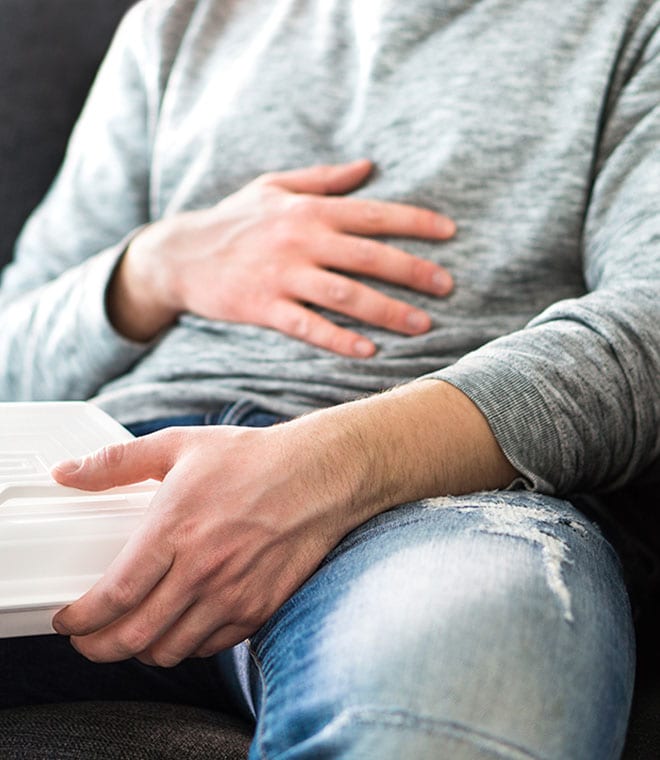Health
Constipation: Causes, symptoms and treatment
By Benjamin Renelus, MD, Gastroenterologist Dec 01, 2023 • 11 min
More than 2.5 million people see their healthcare provider about constipation every year. This very common digestive issue can have a variety of causes, and it can produce a variety of symptoms. Fortunately, there are several effective treatments available to ease constipation and lower the likelihood of it recurring in the future.
What causes constipation?
There are many reasons why a person can develop constipation. The following are some common causes.
1. Diet and lifestyle: What you eat and elements of your lifestyle can lead to constipation. You might have less frequent or more difficult-to-pass bowel movements if you:
- Don’t consume enough dietary fiber
- Haven’t consumed enough water
- Don’t exercise frequently
- Have recently changed your daily routine (for example, you traveled to a different time zone or you started waking up at a different time)
- Frequently resist the urge to move your bowels
Does cheese cause constipation?
Dairy products, particularly milk and cheese, can lead to constipation in some people. This is due to the calcium content of dairy products. While calcium is an essential mineral and is beneficial in a healthy diet, consuming too much in the form of dairy may contribute to constipation.
2. Blockages in the digestive system: Anything that blocks the movement of feces through the colon and rectum can cause constipation. Some factors that can create blockages include:
- Anal fissures
- Bowel obstruction
- Narrowing of the colon
- Rectocele, which occurs when the rectum bulges through the wall of the vagina
- Cancer in the colon, rectum or an organ located near the large intestine
- Fecal impaction, which is a buildup of waste that can occur with chronic constipation
Can a hemorrhoid cause constipation?
Hemorrhoids develop due to pressure on the anus. In some cases, constipation may contribute to hemorrhoids. Hemorrhoids may develop due to straining to pass stool, sitting on the toilet for a long period because you’re finding it difficult to move your bowels and infrequent bowel movements associated with constipation.
3. Hormones: The body relies on hormones to help regulate its natural fluid balance. Medical conditions that affect hormone levels, like diabetes and thyroid disease, can reduce the amount of fluids available to produce soft, easy-to-pass stool and cause constipation. Hormonal changes can also cause constipation during pregnancy.
4. Other medical conditions: Numerous medical conditions that affect the nerves, muscles and digestive system can cause constipation. These include:
- Diverticulitis
- Irritable bowel syndrome (IBS)
- Problems with the pelvic floor muscles that support the reproductive, urinary and lower digestive organs
- Spinal cord injury
- Parkinson’s disease
- Multiple sclerosis
- Lazy bowel syndrome
- Lupus
- Scleroderma
- Amyloidosis
- Nerve damage
- Stroke
In some cases, treating the underlying condition may help ease constipation.
5. Surgery: Many people develop short-term constipation after surgery. Aftereffects of anesthesia, medications prescribed for pain, changes to diet and a lack of exercise during recovery are some of the reasons why this occurs.
6. Medication: Constipation can be a side effect of some medications and supplements, such as:
- Antacids that contain calcium or aluminum
- Certain antidepressants
- Certain antihistamines
- Anti-nausea medications
- Certain anti-seizure medications
- Certain blood pressure medications
- Iron supplements
- Nonsteroidal anti-inflammatory drugs
- Opioid pain relievers
- Certain psychiatric drugs
Does gabapentin cause constipation?
Constipation is a possible side effect of gabapentin, but it’s not as commonly experienced as other side effects, like blurred vision and trembling. Used to treat people with epilepsy and other conditions, gabapentin is an anti-seizure drug.
Does ibuprofen cause constipation?
Ibuprofen can cause constipation, but it is rare. The most common side effects of ibuprofen are nausea, headaches and loss of appetite.
Does acetaminophen cause constipation?
Acetaminophen is unlikely to cause constipation on its own. However, the prescription combination drug that contains acetaminophen and codeine may lead to constipation due to the addition of the opioid pain reliever.
Does prednisone cause constipation?
Constipation is not usually a side effect of prednisone, which is a corticosteroid prescribed to relieve inflammation.
Can stress cause constipation?
Stress can cause constipation. During periods of chronic stress, your digestion system may not work as efficiently, and constipation may occur as a result. When the body’s natural stress response engages, the digestive system slows down so energy can be diverted to other areas in case you need to fight or flee. Once you relax, normal digestion typically resumes.
What are the symptoms of constipation?
The most common symptom of constipation is having fewer bowel movements than usual. Stool texture and shape can also change due to constipation. When you’re constipated, you may pass hard stool, lumpy stool or small pellets of stool. You may have to strain to pass stool, or you may feel as if something is blocking the passage of your stool. Some people also experience abdominal cramping from constipation.
How long can you go without pooping?
The technical medical definition of constipation is moving your bowels fewer than three times per week. However, some people may need to pass stools less frequently. Talk to your healthcare provider anytime that you notice a decrease in the frequency of your bowel movements.
Can constipation cause fever?
On its own, constipation is unlikely to cause a fever. Most often, fevers are due to infections. However, some inflammatory conditions, such as inflammatory bowel disease (IBD), can trigger fevers. People with IBD may also experience constipation, but the fever is due to the underlying condition — not passing stool less frequently.
How is constipation treated?
Healthcare providers may recommend a wide variety of treatments for constipation. Some elements of a treatment plan may include the following:
1. Over-the-counter constipation relief products: There are many over-the-counter products for treating constipation, including:
- Fiber supplements: Fiber supplements for constipation make stool bulkier and easier to pass. Gel-forming soluble fiber, such as psyllium, appears to be most effective for constipation. Other marketed fiber products include gummy capsules, tablets and powders.
- Stimulant laxatives: Drugs like sennosides and bisacodyl cause the bowel muscles to contract, propelling stool through the intestine.
- Osmotic laxatives: Lactulose, magnesium hydroxide, magnesium citrate and polyethylene glycol laxatives stimulate the release of fluid in the intestines to make stool easier to pass.
- Stool softeners: Medications, such as docusate sodium and docusate calcium, attract water from the intestines to make stools softer. There is limited evidence suggesting stool softeners improve constipation.
- Enemas and suppositories: These products work by softening and/or lubricating stool.
Although over-the-counter constipation products are available without a prescription, consult your healthcare provider before using them.
2. Prescription medications: When over-the-counter drugs and self-care fail to relieve constipation, healthcare providers may prescribe medications such as:
- Lactulose (Cephulac, Kristalose
- Linaclotide (Linzess)
- Lubiprostone (Amitiza)
- Plecanatide (Trulance)
- Prucalopride (Prudac, Motegrity
Peripherally acting mu-opioid receptor antagonists (PAMORAs) like methylnaltrexone (Relistor and naloxegol (Movantik) may be prescribed for people who have developed constipation from opioid pain relievers.
3. Surgery: When a structural problem in the digestive system is responsible for constipation, healthcare providers may recommend surgery to correct the issue. Surgical procedures may be beneficial for constipation due to anal fissures, cancer, intestinal stricture, intestinal blockages and other conditions.
4. Lifestyle changes: Making changes to your lifestyle may help to ease constipation and reduce the risk of it occurring in the future. Here are some things you can do:
- Avoid sitting on the toilet for longer than you need to when passing stool
- Drink plenty of water daily
- Eat foods that help with constipation
- Exercise regularly
- Manage your stress through relaxation techniques like deep breathing or yoga
- Move your bowels when you get the urge to go
- Stick to a regular daily schedule whenever possible
While you can find many home remedies for constipation discussed online, there is limited evidence that most work. If you wish to address constipation without medications, it’s best to focus on lifestyle changes.
Managing constipation symptoms
The best way to address constipation and manage symptoms will depend on what’s causing it, your medical history and other factors. Your healthcare provider can develop a treatment plan tailored to your individual needs.
Updated December 2023
Sources:
- https://health.clevelandclinic.org/8-prednisone-side-effects-how-to-minimize-them/
- https://www.mayoclinic.org/drugs-supplements/acetaminophen-and-codeine-oral-route/description/drg-20074117
- https://www.mayoclinic.org/drugs-supplements/acetaminophen-oral-route-rectal-route/description/drg-20068480
- https://my.clevelandclinic.org/health/diseases/4059-constipation
- https://www.mayoclinic.org/diseases-conditions/constipation/symptoms-causes/syc-20354253
- https://www.chop.edu/health-resources/food-medicine-food-therapy-constipation
- https://www.hopkinsmedicine.org/health/wellness-and-prevention/foods-for-constipation
- https://www.mayoclinic.org/drugs-supplements/gabapentin-oral-route/side-effects/drg-20064011?p=1
- https://www.pennmedicine.org/for-patients-and-visitors/patient-information/conditions-treated-a-to-z/hemorrhoids
- https://my.clevelandclinic.org/health/drugs/20168-ibuprofen-capsules-or-tablets
- https://www.mayoclinic.org/drugs-supplements/ibuprofen-oral-route/side-effects/drg-20070602
- https://my.clevelandclinic.org/health/diseases/15587-inflammatory-bowel-disease-overview
- https://www.health.harvard.edu/newsletter_article/natural-ways-to-relieve-constipation
- https://www.mayoclinic.org/drugs-supplements/prednisone-oral-route/side-effects/drg-20075269
- https://my.clevelandclinic.org/health/articles/9663-stool-changes-and-what-they-mean
- https://caps.byu.edu/stress-and-the-digestive-system
- https://www.hss.edu/article_constipation-after-surgery.asp




